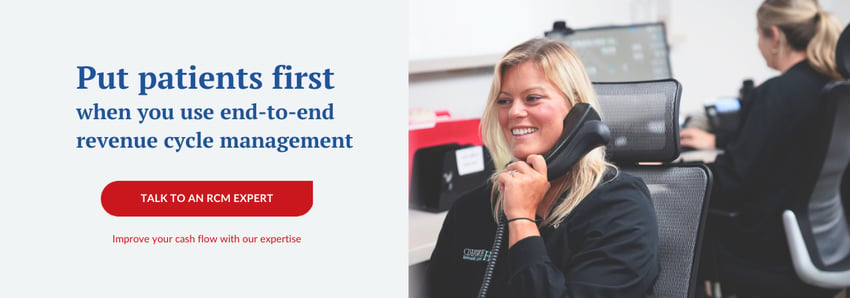Learn the pros and cons of selling your dental practice to a dental service organization


Many dental practice owners ask themselves, “Should I sell my dental practice to a DSO?”
Selling to DSOs isn’t just for dentists who want to retire — younger dentists are beginning to adopt this business model as well.
“Among dentists under 35 years of age, our data show that 18% are in a DSO.” -Academy of General Dentistry
So — What are the benefits and drawbacks of selling to a DSO?
DCS is a full-service revenue cycle management provider. We serve both private practices, and emerging DSOs. We understand that the DSO route is not for everyone, but it is sometimes a saving grace to some dental practices who are overwhelmed by the volume of patients and administrative work.
This article will walk you through the pros and cons of selling your dental practice to a DSO, so that you can decide if this is a good business decision for you.
1. Pros of selling to a DSO
There are several great reasons dental practice owners choose to sell their practice to a DSO.
1. Financial benefits
- Upfront cash payment: One of the financial benefits of selling a dental practice to a DSO is the upfront cash payment that the practice owner receives. This payment provides a significant financial cushion and help you pursue other personal or professional goals, such as retirement or starting a new business venture.
- Revenue sharing: Some DSOs offer revenue-sharing arrangements that allow practice owners to continue earning a percentage of the practice's revenue for a specified period. This provides additional financial security and stability during the transition period.
This goes without saying, but we recommend involving your lawyer and accountant in the negotiations regarding your revenue sharing with the DSO. - Lower overhead costs: Many DSOs will provide their dental practices with new equipment, supplies, and even marketing. This will reduce your overhead costs, leading to an increase in profitability.
Related: How DSOs meet 3 top challenges with revenue cycle management services: 3 problems and solutions
2. Reduced administrative work
- Delegation of non-clinical tasks: DSOs will typically take over a huge portion of the administrative work at your dental practice. Many DSOs outsource to RCM experts to handle tasks such as insurance verification, insurance billing, or patient billing, in order to ensure experts are managing it. This is a huge relief to your in-house team, letting them focus on patients and clinical tasks.
- Access to technology and resources: DSOs will provide dental practices with technology that they may not have been able to afford before the partnership. These resources will streamline administrative processes and reduce the burden of paperwork and record-keeping on your team.
“A DSO has access to vendors to secure equipment at lower prices than a dental practice could. Its technology experts can also ensure that each piece of equipment given to a practice provides the best possible solutions for that practice.” - Benevis
- Reduced HR responsibilities: DSOs will take over human resources responsibilities, including recruitment, training, and benefits administration. This will help manage your staff, freeing up your time and resources to focus on clinical care and patients.
By reducing the administrative workload of your practice, selling to a DSO help you optimize your resources, the patient experience, and your team’s efficiency.
3. Professional support
- Continuing Education Opportunities: Some DSOs will provide continuing education opportunities to their practices, which keeps your team up to date with the latest trends, technologies, and best practices in dentistry.
- Clinical Support: Some DSOs will give practices access to specialist dentists and/or clinical mentors. This provides you with additional resources and expertise to help you manage complex cases and provide better care to your patients.
- Reduced Stress: Support from DSOs provide you with more time and energy to focus on your practice and your patients.
“The ADSO notes increased time with patients, practice support and better work-life balance as some of the main advantages to working for dental practices supported by DSOs.” - ADA
Consulting with professional advisors (lawyer and accountant) will help you make an informed decision about whether selling to a DSO is the right choice for you and your practice.
It's essential to weigh these benefits against potential drawbacks.
-1.jpg?width=545&height=368&name=DSC01060%20(1)-1.jpg)
Cons of selling to a DSO
It’s important to consider if selling to a DSO would negatively affect your practice as a whole.
Here are a few cons of selling to a DSO:
1. Loss of autonomy
- Giving up decision-making power: Many resist selling to DSOs because someone else now has a say in how your dental practice is run. Many dental practices are owned solely by dentists for years, and giving up some control is a challenge.
- Changes in practice culture: Sometimes it won’t impact your in-house team at all to sell to a DSO. But every DSO is different, and some might not be a good fit for your practice. According to this article by Omni Practice Group, “Some will completely change the culture of your practice. They will scare staff away with benefit and salary changes. Some will keep everything the same to the best of their abilities.”
Related: 5 tips for managing a dental practice for the best staff experience
2. Potential reduction in income
- Revenue sharing: DSOs usually operate on a revenue-sharing model, which means that the practice owner will receive a percentage of the practice's revenue instead of the entire profit. This sometimes results in a lower income for the practice owner compared to when they were operating independently.
- Pressure to produce: DSOs typically have revenue expectations for their practices. This puts pressure on the practice to generate revenue. The DSO may have goals that the practice needs to meet, which leads to a focus on production and potentially compromise the quality of care.
“A dentist’s legal and ethical duty of care requires them to always provide care in the best interest of the patient, regardless of the practice model. The licensed dentist — and not the business entity — faces accountability for patient care.” - Academy of General Dentistry
No matter what, patient care has to come first. But the pressure to meet the financial goals of the DSO could keep your team from providing the best patient experience.
3. Uncertainty of the future
- Contractual obligations: Obviously, when you sell to a DSO, you sign a contract that lasts for an agreed amount of time. When you sign your contract with the DSO, you are technically agreeing to something that you can’t 100% predict. This is scary for any business owner.
- Dependence on DSO's success: When you enter an agreement with a DSO, you are assuming that this DSO is going to help make your practice more successful. But if the DSO itself is not successful, your practice won’t be either. Whether it's the economy, or the nature of the dental industry, there’s always a small chance that the DSO could go through hardships that affect your practice’s performance.
Understanding these drawbacks of selling your dental practice to a DSO will help you decide what is the right business decision for you.
Will you sell your dental practice to a dental service organization?
While DSOs bring benefits such as improved resources and professional support, it's essential to consider the potential impact on the practice's identity and reputation.
It's also important to do your due diligence when evaluating potential DSO partners and to work with professional advisors to ensure that the decision to sell aligns with your long-term goals and objectives.
DCS is an end-to-end revenue cycle management service provider. Our experts offer consulting services that will help you make this decision. We help both DSOs and private practice collect income they deserve. Schedule a call to learn more about DCS.
Related Posts
Dental revenue resources from Dental Claim Support

